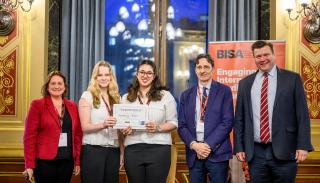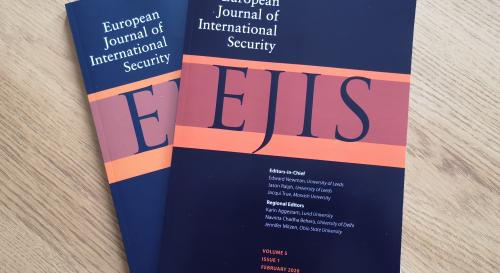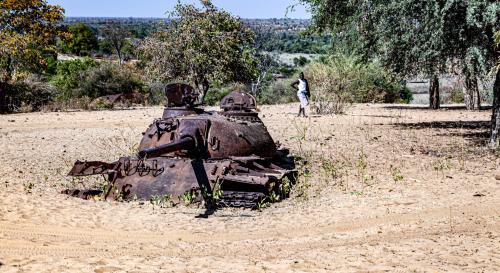
Breadcrumbs navigation
Fifth annual BISA/FCDO Model NATO takes place in London
On Wednesday 6 March approximately 120 participants from 31 UK universities took part in the fifth annual BISA Model NATO. The event is run in partnership with the Foreign Commonwealth and Development Office (FCDO) and took place at its offices in London.
The event began with a warm welcome from academic lead Professor Mark Webber (University of Birmingham), and a representative from FCDO, before moving to some special pre-recorded videos from the UK Delegation to NATO giving the students advice on negotiation skills and how to get the best from the day.
Business then turned to the crisis simulation at hand, which this year focused on multiple earthquakes, resulting in significant loss of life and mass displacement of populations. Two thirds of the participating students sat on the Military Committee, where they were tasked with agreeing a detailed set of actions to be endorsed in a final declaration by a simulated North Atlantic Council - NATO’s highest authority.
Each student had been given a NATO nation to represent and had done research into their country’s resources and political positions prior to the Model. They had also been given two briefings on the hypothetical disaster.
Additionally, we had Brussels-based journalist Teri Schultz in attendance at this year’s event, who worked with a small group of students to draft a facsimile press statement.
Mark Webber said:
“The simulation is designed to provide students with experience of crisis decision-making; to get them into the heads of people having to make tough choices in very testing circumstances. It’s an extremely popular event and continually oversubscribed. The opportunity to put theory into practice in this way, and to work alongside real-life diplomats at the FCDO, is a good one which allows students to develop a range of transferable skills.”
This year’s Model was a great success and well received by the participating students. Dev Engineer, a participant from the University of Middlesex, said:
“We started our day with an update on the crisis then quickly diving into how we can resolve it. Since NATO operates on consensus, it was difficult at times for some drafts and resolutions to pass, however with the amazing guidance of our chair Mark Webber it was always smooth. There were so many learning points on how an actual diplomat works. At times it felt as if our decisions in that room were actually going to affect the people in the world.”
To conclude the event, James Heappey MP - Minister of State for the Armed Forces – addressed the students and assisted with the presentation of delegation awards.
The winners were:
- Outstanding Delegate in the North Atlantic Council: Italy (Birmingham)
- Most Authentic Delegate in the North Atlantic Council: Slovakia (KCL)
- Distinguished Delegate in the North Atlantic Council: Poland (Dundee)
- Outstanding Delegation in the Military Committee: Albania (UCL)
- Most Authentic Delegation in the Military Committee: United Kingdom (Surrey)
- Distinguished Delegation in the Military Committee: Germany (Kent)
All students receive a commemorative certificate for their participation in the event.
Find out more about what took place on the day, and what the participants took from the experience by reading case studies by the student delegations from Northumbria and Sheffield University.


